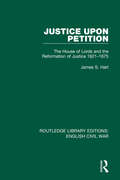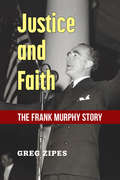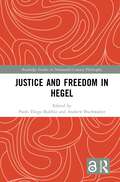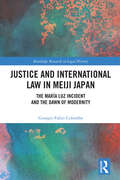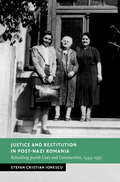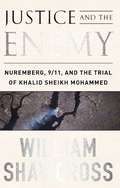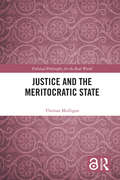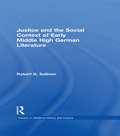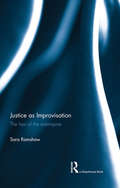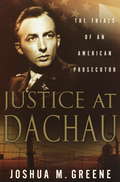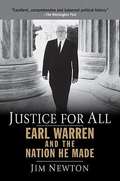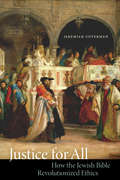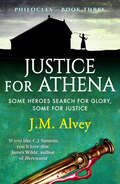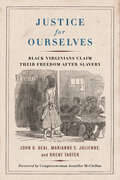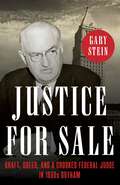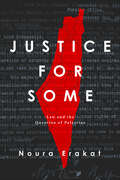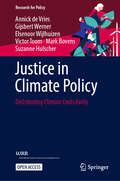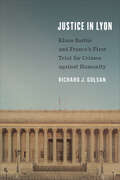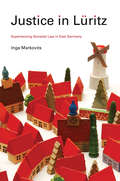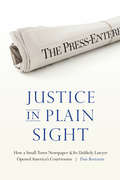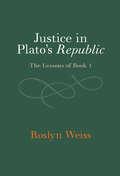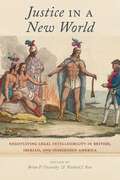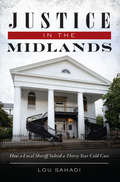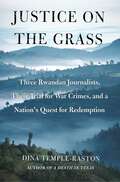- Table View
- List View
Justice Upon Petition: The House of Lords and the Reformation of Justice 1621-1675
by James S. HartOriginally published in 1991, this book traces the evolution of the House of Lords as a court for private litigation during the critically important years from 1621 to 1675. It offers new insights into contemporary politics, government and religion, adding an important dimension to our understanding of the House of Lords. This book is primary reading for advanced undergraduates and postgraduate students on courses on early Stuart England, the Civil War and Restoration history.
Justice and Faith: The Frank Murphy Story
by Greg ZipesFrank Murphy was a Michigan man unafraid to speak truth to power. Born in 1890, he grew up in a small town on the shores of Lake Huron and rose to become Mayor of Detroit, Governor of Michigan, and finally a U.S. Supreme Court Justice. One of the most important politicians in Michigan’s history, Murphy was known for his passionate defense of the common man, earning him the pun “tempering justice with Murphy.” Murphy is best remembered for his immense legal contributions supporting individual liberty and fighting discrimination, particularly discrimination against the most vulnerable. Despite being a loyal ally of Franklin Delano Roosevelt, when FDR ordered the removal of Japanese Americans during World War II, Supreme Court Justice Murphy condemned the policy as “racist” in a scathing dissent to the Korematsu v. United States decision—the first use of the word in a Supreme Court opinion. Every American, whether arriving by first class or in chains in the galley of a slave ship, fell under Murphy’s definition of those entitled to the full benefits of the American dream. Justice and Faith explores Murphy’s life and times by incorporating troves of archive materials not available to previous biographers, including local newspaper records from across the country. Frank Murphy is proof that even in dark times, the United States has extraordinary resilience and an ability to produce leaders of morality and courage.
Justice and Freedom in Hegel (Routledge Studies in Nineteenth-Century Philosophy)
by Andrew Buchwalter Paolo Diego BubbioThis volume explores the relationship between justice and freedom in Hegel’s practical philosophy, with a particular focus on the pivotal concept of reciprocal recognition. The contributors analyze the intersubjective relations between individuals and institutions through the lens of Hegel and demonstrate how his account of justice and freedom can be applied to address pressing issues in political philosophy.Despite extensive scrutiny of the concept of justice by political philosophers, Hegel’s unique account has been notably overlooked. What sets Hegel apart is his emphasis on the inseparable link between justice and freedom. Freedom is inextricably tied to an account of just social relations and institutions, while justice itself is intertwined with a robust endorsement of freedom. The chapters comprising this volume examine three crucial dimensions of Hegel’s framework for freedom and justice. First, the contributors address how Hegel’s distinctive integration of freedom and justice sheds new light on the nature of his practical philosophy. Second, they relate Hegel’s theory to other prominent accounts of justice, including Rawlsian forms of Kantian constructivism, Habermas’ neo‑Kantian discourse theory, republican views, neo‑Aristotelian accounts, and critical theory approaches. Finally, the contributors apply Hegel’s reconstructed theory of justice to ongoing debates encompassing criminal justice, distributive justice, global justice, environmental justice, and issues related to racial and gender justice, as well as populism.Justice and Freedom in Hegel will appeal to scholars and advanced students engaged in research on Hegel’s practical philosophy, 19th‑century philosophy, and political philosophy.
Justice and International Law in Meiji Japan: The María Luz Incident and the Dawn of Modernity (Routledge Research in Legal History)
by Giorgio Fabio ColomboThis book carries out a comprehensive analysis of the María Luz incident, a truly significant episode in Japanese and world history, from a legal perspective. In July 1872, the María Luz, a barque flying the Peruvian flag, carried Chinese indentured servants from Macau to Peru. After the ship stopped for repairs in Kanagawa Bay, a number of legal issues arose that were destined to change the perception and use of the law in Japan forever. The case had a tremendous impact on the collective imagination, both Japanese and international: it is one of the first occurrences in which an Asian country decided to resist the pressure of a Western nation, and responded using the most refined tools of domestic and international law. Moreover, the final outcome of the case (arbitration in front of the Czar of Russia) marks the debut of Japan on the stage of international arbitration. While historians have written widely on the subject, the legal importance of this event has been relatively neglected. This book uses the case to explore the technical legal issues Japan was facing in its transition from pre-modernity to modernity. These include unequal treaties, extraterritoriality clauses, the need to establish an updated judicial system, and a delicate balance between asserting sovereignty and resorting to diplomacy in solving disputes involving foreigners. Based on original documents, this book is an invaluable resource for researchers and academics in the fields of legal history, dispute resolution, international law, Japanese history and Asian studies.
Justice and Restitution in Post-Nazi Romania: Rebuilding Jewish Lives and Communities, 1944–1950 (New Studies in European History)
by Stefan Cristian IonescuOn 23rd August 1944, following the collapse of the pro-Nazi dictatorship of Ion Antonescu, Romania changed sides and abandoned the Axis to join the Allies. Justice and Restitution in Post-Nazi Romania explores the hopes, struggles and disappointments of Jewish communities in Romania seeking to rebuild their lives after the Holocaust. Focusing on the efforts of survivors to recuperate rights and property, Stefan Cristian Ionescu demonstrates how the early transitional government enabled short term restitution. However, from 1948, the consolidated communist regime implemented nationalizations which dispossessed many citizens. Jewish communities were disproportionality affected, and real estate and many businesses were lost once again. Drawing on archival sources from government documentation to diaries and newspaper reports, this study explores both the early success and later reversal of restitution policies. In doing so, it sheds light on the postwar treatment of Romanian Jewish survivors, and the reasons so many survivors emigrated from Romania.
Justice and the Enemy: Nuremberg, 9/11, and the Trial of Khalid Sheikh Mohammed
by William ShawcrossSince the Nuremberg Trials of 1945, lawful nations have struggled to impose justice around the world, especially when confronted by tyrannical and genocidal regimes. But in Cambodia, the USSR, China, Bosnia, Rwanda, and beyond, justice has been served haltingly if at all in the face of colossal inhumanity. International Courts are not recognized worldwide. There is not a global consensus on how to punish transgressors. The war against Al Qaeda is a war like no other. Osama bin Laden, Al Qaeda's founder, was killed in Pakistan by Navy Seals. Few people in America felt anything other than that justice had been served. But what about the man who conceived and executed the 9/11 attacks on the US, Khalid Sheikh Mohammed? What kind of justice does he deserve? The U. S. has tried to find the high ground by offering KSM a trial - albeit in the form of military tribunal. But is this hypocritical? Indecisive? Half-hearted? Or merely the best application of justice possible for a man who is implacably opposed to the civilization that the justice system supports and is derived from? In this book, William Shawcross explores the visceral debate that these questions have provoked over the proper application of democratic values in a time of war, and the enduring dilemma posed to all victors in war: how to treat the worst of your enemies.
Justice and the Meritocratic State (Political Philosophy for the Real World)
by Thomas MulliganLike American politics, the academic debate over justice is polarized, with almost all theories of justice falling within one of two traditions: egalitarianism and libertarianism. This book provides an alternative to the partisan standoff by focusing not on equality or liberty, but on the idea that we should give people the things that they deserve. Mulligan sets forth a theory of economic justice—meritocracy—which rests upon a desert principle and is distinctive from existing work in two ways. First, meritocracy is grounded in empirical research on how human beings think, intuitively, about justice. Research in social psychology and experimental economics reveals that people simply don’t think that social goods should be distributed equally, nor do they dismiss the idea of social justice. Across ideological and cultural lines, people believe that rewards should reflect merit. Second, the book discusses hot-button political issues and makes concrete policy recommendations. These issues include anti-meritocratic bias against women and racial minorities and the United States’ widening economic inequality. Justice and the Meritocratic State offers a new theory of justice and provides solutions to our most vexing social and economic problems. It will be of keen interest to philosophers, economists, and political theorists.
Justice and the Social Context of Early Middle High German Literature (Studies in Medieval History and Culture #5)
by Robert G. SullivanThis book argues that far from preaching traditional, otherworldly ideals, the authors or these religious works were deeply engaged in the social, political, and spiritual issues that characterized the Holy Roman Empire at a time of radical transformation.
Justice as Improvisation: The Law of the Extempore
by Sara RamshawJustice as Improvisation: The Law of the Extempore theorises the relationship between justice and improvisation through the case of the New York City cabaret laws. Discourses around improvisation often imprison it in a quasi-ethical relationship with the authentic, singular ‘other’. The same can be said of justice. This book interrogates this relationship by highlighting the parallels between the aporetic conception of justice advanced by the late French philosopher Jacques Derrida and the nuanced approach to improvisation pursued by musicians and theorists alike in the new and emerging interdisciplinary field of Critical Studies in Improvisation (CSI). Justice as Improvisation re-imagines justice as a species of improvisation through the formal structure of the most basic of legal mechanisms, judicial decision-making, offering law and legal theory a richer, more concrete, understanding of justice. Not further mystery or mystique, but a negotiation between abstract notions of justice and the everyday practice of judging. Improvisation in judgment calls for ongoing, practical decision-making as the constant negotiation between the freedom of the judge to take account of the otherness or singularity of the case and the existing laws or rules that both allow for and constrain that freedom. Yes, it is necessary to judge, yes, it is necessary to decide, but to judge well, to decide justly, that is a music lesson perhaps best taught by critical improvisation scholars.
Justice at Dachau
by Joshua GreeneThe world remembers Nuremberg, where a handful of Nazi policymakers were brought to justice, but nearly forgotten are the proceedings at Dachau, where hundreds of Nazi guards, officers, and doctors stood trial for personally taking part in the torture and execution of prisoners inside the Dachau, Mauthausen, Flossenburg, and Buchenwald concentration camps. In Justice at Dachau, Joshua M. Greene, maker of the award winning documentary film Witness: Voices from the Holocaust, recreates the Dachau trials and reveals the dramatic story of William Denson, a soft-spoken young lawyer from Alabama whisked from teaching law at West Point to leading the prosecution in the largest series of Nazi trials in history. In a makeshift courtroom set up inside Hitler's first concentration camp, Denson was charged with building a team from lawyers who had no background in war crimes and determining charges for crimes that courts had never before confronted. Among the accused were Dr. Klaus Schilling, responsible for hundreds of deaths in his "research" for a cure for malaria; Edwin Katzen-Ellenbogen, a Harvard psychologist turned Gestapo informant; and one of history's most notorious female war criminals, Ilse Koch, "Bitch of Buchenwald," whose penchant for tattooed skins and human bone lamps made headlines worldwide. Denson, just thirty-two years old, with one criminal trial to his name, led a brilliant and successful prosecution, but nearly two years of exposure to such horrors took its toll. His wife divorced him, his weight dropped to 116 pounds, and he collapsed from exhaustion. Worst of all was the pressure from his army superiors to bring the trials to a rapid end when their agenda shifted away from punishing Nazis to winning the Germans' support in the emerging Cold War. Denson persevered, determined to create a careful record of responsibility for the crimes of the Holocaust. When, in a final shocking twist, the United States used clandestine reversals and commutation of sentences to set free those found guilty at Dachau, Denson risked his army career to try to prevent justice from being undone.From the Hardcover edition.
Justice for All: Earl Warren and the Nation He Made
by Jim NewtonIn Justice for All, Jim Newton, an award-winning journalist for the Los Angeles Times, brings readers the first truly comprehensive consideration of Earl Warren, the politician-turned-Chief Justice who refashioned the place of the court in American life through landmark Supreme Court cases whose names have entered the common parlance -- Brown v. Board of Education, Griswold v. Connecticut, Miranda v. Arizona, to name just a few. Drawing on unmatched access to government, academic, and private documents pertaining to Warren's life and career, Newton explores a fascinating angle of U. S. Supreme Court history while illuminating both the public and the private Warren. One of the most acclaimed and best political biographies of its time, Justice for All is a monumental work dedicated to a complicated and principled figure that will become a seminal work of twentieth-century U. S. history. .
Justice for All: How the Jewish Bible Revolutionized Ethics (JPS Essential Judaism)
by Jeremiah UntermanJustice for All demonstrates that the Jewish Bible, by radically changing the course of ethical thought, came to exercise enormous influence on Jewish thought and law and also laid the basis for Christian ethics and the broader development of modern Western civilization. Jeremiah Unterman shows us persuasively that the ethics of the Jewish Bible represent a significant moral advance over Ancient Near East cultures. Moreover, he elucidates how the Bible’s unique conception of ethical monotheism, innovative understanding of covenantal law, and revolutionary messages from the prophets form the foundation of many Western civilization ideals. Justice for All connects these timeless biblical texts to the persistent themes of our times: immigration policy, forgiveness and reconciliation, care for the less privileged, and attaining hope for the future despite destruction and exile in this world.
Justice for Athena (Philocles)
by J. M. AlveyA playwright turned amateur sleuth who is &“the perfect protagonist&” solves a murder at a celebration in this historical mystery set in ancient Greece (Financial Times). It&’s festival time in Athens, and Philocles is looking forward to the holiday. Visitors are coming from across the Hellenic world for eight days of sporting competitions, musical contests, and sacred rites to honor Athena, the city&’s patron goddess. Thousands will flock to the Pnyx to be enthralled by the dramatic three-day performance of Homer&’s Iliad, an entertainment unique to the Great Panathenaea. Taking part is the highest honor and greatest challenge for an epic poet. Then one of the poets is brutally murdered. Is this random misfortune, an old score being settled, or is someone trying to sabotage the festival? The authorities want this cleared up quickly and quietly. Philocles finds himself on the trail of a killer once more . . . Longlisted for the 2021 CWA Sapere Books Historical Dagger Praise for the writing of J. M. Alvey: &“Historical writing at its best. Riveting.&” —Manda Scott, author of the Boudica series &“Superb . . . A fabulous read.&” —The Irish Times &“If you like C J Sansom's Tudor sleuth Matthew Shardlake, you'll love this.&” —James Wilde, author of Hereward and Pendragon &“Great sense of place, terrific characters and a cracking plot.&” —Joanne Harris, New York Times–bestselling author of Chocolat &“As vivid and lively as a Greek wedding—but with rather more blood!&” —Val McDermid, author of the Kate Brannigan Mysteries &“It's about time someone did for ancient Athens what Lindsey Davis&’ Falco novels do for Ancient Rome.&” —Jack Grimwood, author of Moskva
Justice for Ourselves: Black Virginians Claim Their Freedom after Slavery (The American South Series)
by Brent Tarter John G. Deal Marianne E. JulienneA new look at the Black Virginians who defined and realized their freedom after the collapse of slavery &“Verily, the work does not end with the abolition of slavery,&” wrote Frederick Douglass in 1862, &“but only begins.&” The Emancipation Proclamation and the Thirteenth Amendment altered a legal status; to make freedom a reality represented a different challenge altogether.Justice for Ourselves tells the stories of remarkable Black men and women in post–Civil War Virginia who persevered in the face of overwhelming barriers to seek their freedom and create a new world for themselves and future generations. Drawing on the life stories of individuals from all regions of the state—political leaders, teachers, ministers, journalists, and entrepreneurs—Justice for Ourselves recounts their quests to attain full American citizenship and economic independence before the onset of Jim Crow repression. Centering Black voices, this book includes tales of opportunities seized and opportunities lost and will reshape the narrative of Black history and the history of Virginia in the second half of the nineteenth century.
Justice for Sale: Graft, Greed, and a Crooked Federal Judge in 1930s Gotham
by Gary SteinMartin T. Manton was a corrupt federal appeals court judge in New York who was convicted in 1939 and sent to prison. At the time, this was a hugely important story: Manton was considered the highest-ranking judge in the United States after the nine Justices of the Supreme Court, and was nearly appointed to that august body in 1922. Yet his story has never been told in book-length form before, and never with the benefit of such exhaustive research. More than just a biography, Justice for Sale examines Manton&’s misconduct in the context of the culture of corruption and organized crime that permeated New York City in the first part of the twentieth century. Dozens of others—prominent business executives, leading Wall Street lawyers, accountants, bankers, fixers, con men, another federal judge—participated in Manton&’s crimes. The book profiles these unscrupulous and often colorful characters as well. It wasn&’t until Manhattan D.A. and future presidential candidate Thomas Dewey&’s successful pursuit of Manton, a federal grand jury investigation, and a sensational prosecution and trial in federal court that shocked the nation that Manton and his corrupt schemes were finally brought down.
Justice for Some: Law and the Question of Palestine
by Noura ErakatJustice in the Question of Palestine is often framed as a question of law. Yet none of the Israel-Palestinian conflict's most vexing challenges have been resolved by judicial intervention. Occupation law has failed to stem Israel's settlement enterprise. Laws of war have permitted killing and destruction during Israel's military offensives in the Gaza Strip. The Oslo Accord's two-state solution is now dead letter. Justice for Some offers a new approach to understanding the Palestinian struggle for freedom, told through the power and control of international law. Focusing on key junctures—from the Balfour Declaration in 1917 to present-day wars in Gaza—Noura Erakat shows how the strategic deployment of law has shaped current conditions. Over the past century, the law has done more to advance Israel's interests than the Palestinians'. But, Erakat argues, this outcome was never inevitable. Law is politics, and its meaning and application depend on the political intervention of states and people alike. Within the law, change is possible. International law can serve the cause of freedom when it is mobilized in support of a political movement. Presenting the promise and risk of international law, Justice for Some calls for renewed action and attention to the Question of Palestine.
Justice in Asia and the Pacific Region, 1945-1952
by Yuma TotaniThis book explores a cross section of war crimes trials that the Allied powers held against the Japanese in the aftermath of World War II. More than 2,240 trials against some 5,700 suspected war criminals were carried out at 51 separate locations across the Asia Pacific region. This book analyzes fourteen high-profile American, Australian, British, and Philippine trials, including the two subsequent proceedings at Tokyo and the Yamashita trial. By delving into a large body of hitherto underutilized oral and documentary history of the war as contained in the trial records, Yuma Totani illuminates diverse firsthand accounts of the war that were offered by former Japanese and Allied combatants, prisoners of war, and the civilian population. Furthermore, the author makes a systematic inquiry into select trials to shed light on a highly complex - and at times contradictory - legal and jurisprudential legacy of Allied war crimes prosecutions.
Justice in Climate Policy: Distributing Climate Costs Fairly (Research for Policy)
by Mark Bovens Victor Toom Annick de Vries Gijsbert Werner Elsenoor Wijlhuizen Suzanne HulscherThis open access book is looking into ways to achieve just climate policy within a country. The authors of this monograph share a unique, timely and original vision: continuous support for climate policy is more likely to emerge when citizens find that the distribution of the bill for climate costs is fair. But what is a fair distribution of climate costs? This is an important question because financial costs of mitigation (reducing greenhouse gases), adaptation (adapting to climate change) and damage (compensating or compensating after weather extremes) increase significantly in the coming decades. Drawing on philosophy and ethics, the authors propose ten principles for achieving just distributions of domestic climate costs. Examples of such principles are individual responsibility, the polluter pays, greatest utility and capacity to pay. Yet what a fair distribution is, depends on, for example, political preferences and the policy issue at hand. Empirical research on designing climate policies, however, shows that distributive principles are not part of the political, policy, and public discussions. The authors therefore argue that explicit attention to principles of just distribution at the start of a policy process contributes to support for climate policy. This book provides tools to professionals and students to achieve justice in climate policy.
Justice in Lyon: Klaus Barbie and France’s First Trial for Crimes against Humanity
by Richard J. GolsanThe trial of former SS lieutenant and Gestapo chief Klaus Barbie was France’s first trial for crimes against humanity. Known as the "Butcher of Lyon" during the Nazi occupation of that city from 1942 to 1944, Barbie tortured, deported, and murdered thousands of Jews and Resistance fighters. Following a lengthy investigation and the overcoming of numerous legal and other obstacles, the trial began in 1987 and attracted global attention. Justice in Lyon is the first comprehensive history of the Barbie trial, including the investigation leading up to it, the legal background to the case, and the hurdles the prosecution had to clear in order to bring Barbie to justice. Richard J. Golsan examines the strategies used by the defence, the prosecution, and the lawyers who represented Barbie’s many victims at the trial. The book draws from press coverage, articles, and books about Barbie and the trial published at the time, as well as recently released archival sources and the personal archives of lawyers at the trial. Making the case that, despite the views of its many critics, the Barbie trial was a success in legal, historical, and pedagogical terms, Justice in Lyon details how the trial has had a positive impact on French and international law governing crimes against humanity.
Justice in Lüritz: Experiencing Socialist Law in East Germany
by Inga MarkovitsAs a child, Inga Markovits dreamt of stealing and reading every letter contained in a mailbox at a busy intersection of her town in order to learn what life is all about. When, decades later, working as a legal historian, she tracked down the almost complete archive of a former East German trial court, she knew that she had finally found her mailbox. Combining her work in this extraordinary archive with interviews of former plaintiffs and defendants, judges and prosecutors, government and party functionaries, and Stasi collaborators, all in the little town she calls "Lüritz," Markovits has written a remarkable grassroots history of a legal system that set out with the utopian hopes of a few and ended in the anger and disappointment of the many. This is a story of ordinary men and women who experienced Socialist law firsthand--people who applied and used the law, trusted and resented it, manipulated and broke it, and feared and opposed it, but who all dealt with it in ways that help us understand what it meant to be a citizen in a twentieth-century Socialist state, what "Socialist justice" aimed to do, and how, in the end, it failed. Brimming with human stories of obedience and resistance, endurance and cunning, and cruelty and grief, Justice in Lüritz is ultimately a book about much more than the law, or Socialism, or East Germany.
Justice in Plain Sight: How a Small-Town Newspaper and Its Unlikely Lawyer Opened America's Courtrooms
by Dan BernsteinJustice in Plain Sight is the story of a hometown newspaper in Riverside, California, that set out to do its job: tell readers about shocking crimes in their own backyard. But when judges slammed the courtroom door on the public, including the press, it became impossible to tell the whole story. Pinning its hopes on business lawyer Jim Ward, whom Press-Enterprise editor Tim Hays had come to know and trust, the newspaper took two cases to the U.S. Supreme Court in the 1980s. Hays was convinced that the public—including the press—needed to have these rights and needed to bear witness to justice because healing in the aftermath of a horrible crime could not occur without community catharsis. The newspaper won both cases and established First Amendment rights that significantly broadened public access to the judicial system, including the right for the public to witness jury selection and preliminary hearings.Justice in Plain Sight is a unique story that, for the first time, details two improbable journeys to the Supreme Court in which the stakes were as high as they could possibly be (and still are): the public's trust in its own government.
Justice in Plato's Republic: The Lessons of Book 1
by Roslyn WeissIn Book 4 of Plato's Republic, Socrates introduces what is regarded by scholars as the Platonic account of justice, according to which it is essentially internal and self-regarding, a matter of relations among the parts of a city or soul. In this book, Roslyn Weiss contends that there is another notion of justice, as other-regarding and external, which is to be found in a series of conversations in Book 1 between Socrates and three successive interlocutors. Weiss considers the relationship between justice as conceived in Book 1 and Book 4, and carefully examines what can be learned from each of the arguments. Her close analysis of Book 1 brings to light what Socrates really believed about justice, and extracts and explores this Book's many insights concerning justice—at both the political and the personal level.
Justice in a New World: Negotiating Legal Intelligibility in British, Iberian, and Indigenous America (Religion and Social Transformation)
by Brian P Owensby Richard J RossA historical and legal examination of the conflict and interplay between settler and indigenous laws in the New WorldAs British and Iberian empires expanded across the New World, differing notions of justice and legality played out against one another as settlers and indigenous people sought to negotiate their relationship. In order for settlers and natives to learn from, maneuver, resist, or accommodate each other, they had to grasp something of each other's legal ideas and conceptions of justice.This ambitious volume advances our understanding of how natives and settlers in both the British and Iberian New World empires struggled to use the other’s ideas of law and justice as a political, strategic, and moral resource. In so doing, indigenous people and settlers alike changed their own practices of law and dialogue about justice. Europeans and natives appealed to imperfect understandings of their interlocutors’ notions of justice and advanced their own conceptions during workaday negotiations, disputes, and assertions of right. Settlers’ and indigenous peoples’ legal presuppositions shaped and sometimes misdirected their attempts to employ each other’s law. Natives and settlers construed and misconstrued each other's legal commitments while learning about them, never quite sure whether they were on solid ground. Chapters explore the problem of “legal intelligibility”: How and to what extent did settler law and its associated notions of justice became intelligible—tactically, technically and morally—to natives, and vice versa? To address this question, the volume offers a critical comparison between English and Iberian New World empires. Chapters probe such topics as treaty negotiations, land sales, and the corporate privileges of indigenous peoples. Ultimately, Justice in a New World offers both a deeper understanding of the transformation of notions of justice and law among settlers and indigenous people, and a dual comparative study of what it means for laws and moral codes to be legally intelligible.
Justice in the Midlands: How a Local Sheriff Solved a Thirty-Year Cold Case (True Crime)
by Lou SahadiThe murder of Ron "Little Red" Beasley is one of the most bizarre homicide cases in Midlands history. This mystery, with a background of macabre events and colorful characters, remained unsolved since 1967. Beasley's murder was originally ruled a suicide, but his family and his friend Herman Young refused to believe that. When Beasley's wife was convicted of murdering her second husband, they grew even more suspicious. Young went on to become sheriff of Fairfield County and made it his mission to find the truth. Join author Lou Sahadi as he details the gruesome details of a murder, two dramatic court trials and the untiring work of a lawman to find justice for his friend.
Justice on the Grass: Three Rwandan Journalists, Their Trial for War Crimes and a Nation's Quest for Redemption
by Dina Temple-RastonThe 1994 Rwandan genocide, in which more than 800,000 Tutsi and moderate Hutu were massacred in just 100 days, was an unparalleled modern-day slaughter. How does a nation pick up the pieces after the killing has stopped?In a gripping narrative that examines the power of the press and sheds light on how the media turned tens of thousands of ordinary Rwandans into murderers, award-winning author and journalist Dina Temple-Raston traces the rise and fall of three media executives -- Ferdinand Nahimana, Jean-Bosco Barayagwiza, and Hassan Ngeze. From crime to trial to verdict, Temple-Raston explores the many avenues of justice Rwanda pursued in the decade after the killing. Focusing on the media trial at the United Nations International Criminal Tribunal for Rwanda, she then drops down to the level of the hills, where ordinary Rwandans seek justice and retribution, and examines whether politics in the East African nation has set the stage for renewed violence. In the months leading up to the killing, two local media outlets, Radio Télévision Libre des Mille Collines (RTLM) and the tabloid newspaper Kangura, warned that a bloody confrontation was brewing. No one would be spared, they said. Observers said later that fearmongering from RTLM and Kangura played a key role in igniting the genocide, so much so that the three men behind the media outlets became the first journalists since Nuremberg to be tried in an international court for crimes against humanity. Drawing on extensive interviews with key players, Dina Temple-Raston brings to life a cast of remarkable characters: the egotistical newspaper editor Hassan Ngeze; hate radio cofounders, the intellectual Ferdinand Nahimana and the defiant legal scholar Jean-Bosco Barayagwiza; an American-led prosecution team wary of a guilty verdict that might bring a broadly written judgment muzzling the press the world over; the bombastic American defense attorney John Floyd; heroic Damien Nzabakira, who risked his life to drive forty orphans to safety only to spend eight years in prison accused of their murder; and Bonaventure Ubalijoro, a Rwandan diplomat and politician who believed in miracles. An extraordinary feat of reporting and narrative, Justice on the Grass reveals a Rwanda few have seen. A searing and compassionate book, Justice on the Grass illustrates how, more than a decade later, a country and its people are still struggling to heal, to forgive, and to make sense of something that defies credibility and humanity.
